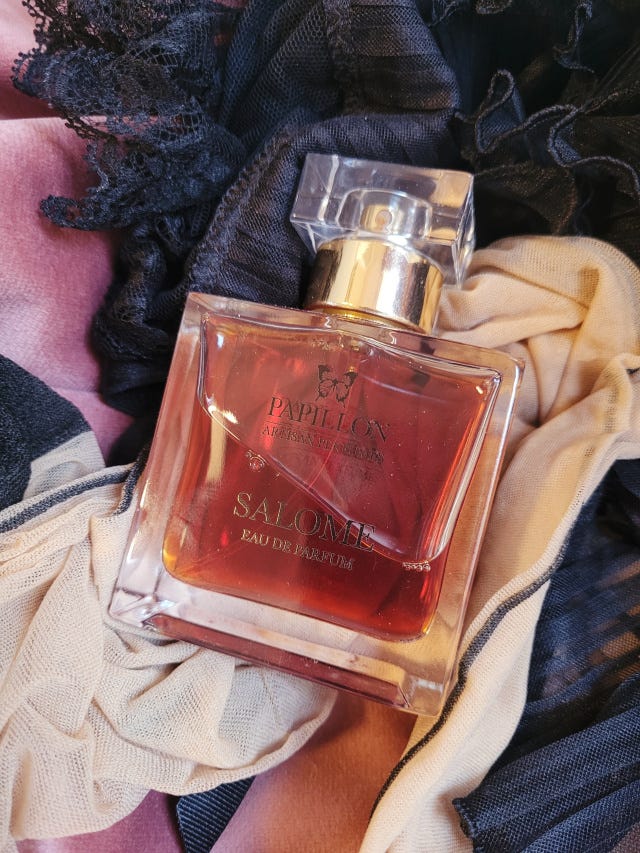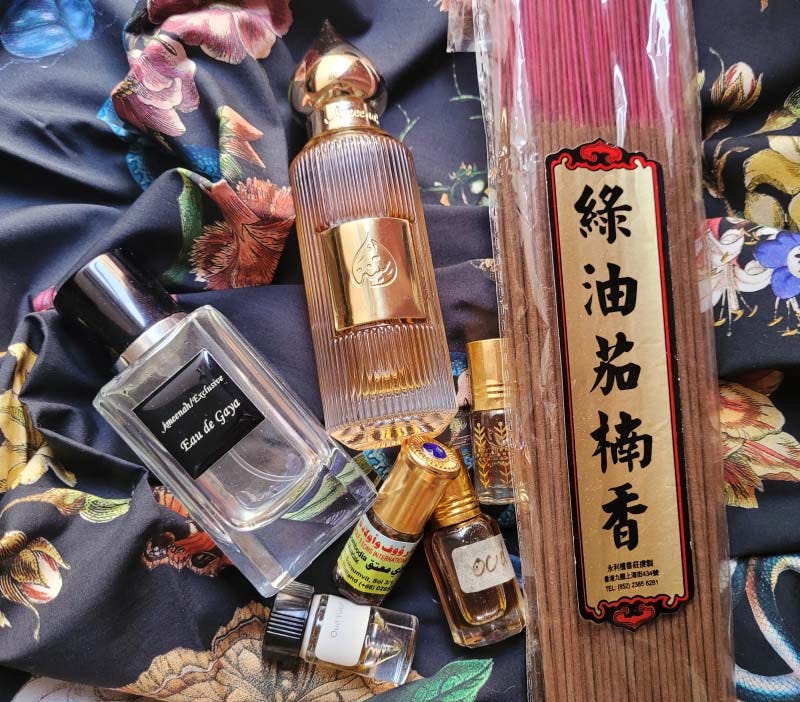Smelly Old Things
Kawai Shen on uncommon perfume, escaping the feminine youth cult and the transformative power of scent.
I grew up in a cohort of women who divided perfumes into a patriarchal binary: fuckable, or not. Us fuckable girls were too young to recall the fragrance industry as anything other than a multinational marketing machine churning out a pink-hued sea of generic fruity florals, tooth-rotting gourmands and synthetic aquatics. The rest of fragrance history ended up ignobly cast into the dreaded “old lady” category. Into that bin went all the grand dame classics like No. 5, Shalimar, Opium. To us, these were the scents of menopause and spinsterhood. The more bombastic the perfume, the more it aged you. Think chiaroscuro chypres topped with scintillating aldehydes and darkened with bitter oakmoss; lavish spicy ambers lush with unsweetened vanilla and expensive resins; ultra-femme powder bombs grounded by creamy orris butter and animal musks. Those complex, smelly old things had nothing to do with us girls. No, we preferred to spray ourselves with the latest fresh and wan celebuscent flanker, choking ourselves on cheap fillers like white laundry musks and Iso E Super. We were feral, as youth always are, but our perfumes were sanitized, offering an eternally prepubescent model of femininity.
I wanted the olfactory equivalent of a switchblade pressing against your ribs in broad daylight.
It wasn’t just perfume. My peers and I were taught to believe that our bodies should always smell like freshly laundered linens or just-soaped-and-showered skin. We were trained to be douched and deodorized, both literally and figuratively, in an overarching feminine project to make ourselves as inoffensive, approachable, and obliging as possible.
Well I don’t believe in false advertising.
I wanted a perfume that captured the exhilaration of a throng of hardcore, sweaty bodies thrashing together in a mosh pit. I wanted the olfactory equivalent of a switchblade pressing against your ribs in broad daylight. I wanted what I wore to flag left, and black, a signal for the small-minded and easily startled to keep their distance and the gluttons for punishment to draw closer. Pink pepper, lychee and fresh peonies just weren’t doing that for me.
The sales associates I encountered didn’t seem to understand. When prompted to describe what I was looking for, I’d drop my voice into a conspiratorial tone and ask for something naughty, something nasty, something bitchy, something with a little rrrrr. Then they would appraise my appearance as a small, East Asian ciswoman and offer me some insipid, blushing tea-rosy thing or whatever they’d likely had a great deal of success selling. Once, after being handed a card sprayed with the latest fruity commercial dreck, I shook my head. “I’m looking for a perfume that would suit a Mrs. Robinson cougar type.” I think the SA flinched.
What was so repellant about referencing the cinematic figure of an older woman acting on her sexual desires? When I was in my twenties, I wished I were in my forties. I cherished the company of my older friends, especially these self-possessed women who had nothing to prove to anyone. I observed how they had dispensed with the kind of self-centered, self-mythologizing narratives that still animated peers my age. I looked forward to the day I could join their ranks after sloughing off years of gendered indoctrination that had trained me to accommodate men. I did not care to cling to my youth because I knew it was in part because of my youth—and race—that I was being treated as submissive, and it was why I was frequently punished when I refused to comply with such expectations. I figured I may not have been in my forties, but I could at least smell like a grand dame.
I reveled in rolling around in so much richness and filth, in corporeal compositions redolent with the dank and the sullied, accords that evoked not just sex and death, but obscenity, wastage, injury, ruin.
I eventually lucked out when I met an SA who encouraged me to take matters into my own hands, or nose as it were. He introduced me to websites where I could order fragrance samples from independent houses working with funkier ingredients like costus, labdanum, castoreum, oud. He sprayed Une Fleur de Cassie onto my wrist, an aldehydic floral scent shot through with spice and purring with musk, evoking soft focus pre-code Hollywood starlets with penciled brows and fur stoles. Broads with wit and cunning; Venuses in Furs who were untouchable. Anna May Wong in Paris and pearls. I was immediately hooked.
No, I was completely obsessed.
I memorized a new vocabulary to describe what I was looking for: indolic, animalic, barnyard. I trawled through perfume blogs and discussion forums and borrowed reference texts from the library. I put anything and everything in my nose: vintage decants, unwearable niche oddities, even the latest designer and celebrity releases. I trained myself to identify notes from essential oils to aromachemicals. Galbanum was bitter and vegetal, with enough rotting-garbage acerbity to conjure the knife-edge I was looking for. South East Asian ouds I loved for their gentle, fruity funk, a body odour that could envelope the torso like a harness of velvet rope. Jasmine grandiflorum could be loud with banana peels, obscenely fleshy and minerally with naphthalene all at once and yet, it would still smell achingly beautiful.
I fell in love over and over. I reveled in rolling around in so much richness and filth, in corporeal compositions redolent with the dank and the sullied, accords that evoked not just sex and death, but obscenity, wastage, injury, ruin. The smoking leathery bullwhip crack of Bandit’s opening. The rotting fruit and damp knickers kicked up with cumin that is Oliver Cresp’s version of Femme. The flurry of rose petals dragged through the dung pile of Oudh Infini. The pissy, spice-infused honey rich enough to embalm with in Absolue Pour Le Soir. One of my favourite ways to wear Salome, a gorgeous, sexed-up, stinking floral, was to dab it on the welts of my stockings where they rested against my inner thighs before heading out to go clubbing.

I wore fragrances marketed to men in equal measure as well. One of my favourite men’s fragrances is Fetish Pour Homme, a growling, aggressively filthy version of the great spicy leather chypre, Bel Ami. Fetish is so intense, one drop of this juice makes you smell like you’ve been smearing raw secretions against your skin. It absolutely sends me. My understanding is that the crass term applied to scents like this is “panty dropper.” I don’t know about that, but I did spread my wallet wide open.
Did dousing myself in these decidedly unpopular fragrances (at time of writing, both Oudh Infini and Absolue Pour Le Soir have been discontinued) change the way people treated me? In the end, it didn’t matter. These perfumes brought me so much eye-rolling pleasure. They breathed life into my own fragrant fantasy where women could express themselves without reprisal, could broadcast and radiate their own power, and that pleased me as well. Perhaps the mere existence of that utopian desire was enough to change me.
Shortly after discovering Fetish, I wore him out to a party. A man I knew and enjoyed for his mordant sense of humour was in attendance. He drew close, bringing his lips to my ear: “You smell amazing.” I realized that the old neural pathways that would have fired up an automated response to deflect his compliment, or to smile and thank him, had died.
Instead, I turned to face him, my voice weighted with my own certitude: “I know.”
Also by Kawai Shen:
Just Desserts
The modern gourmand perfume has been laden with cultural baggage from its inception. Ever since Mugler’s blockbuster fruitchouli Angel burst onto the scene in the early 1990s, a perfume that seemed more flavour than fragrance, gourmands have stubbornly remained associated with desserts despite niche forays into more savory territory. This sweet tooth te…





